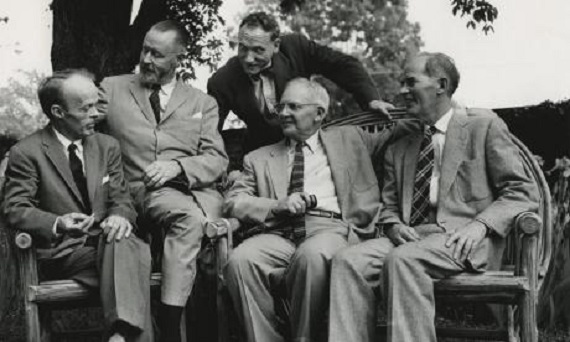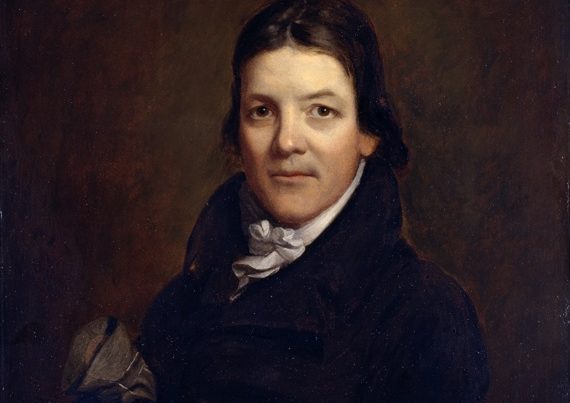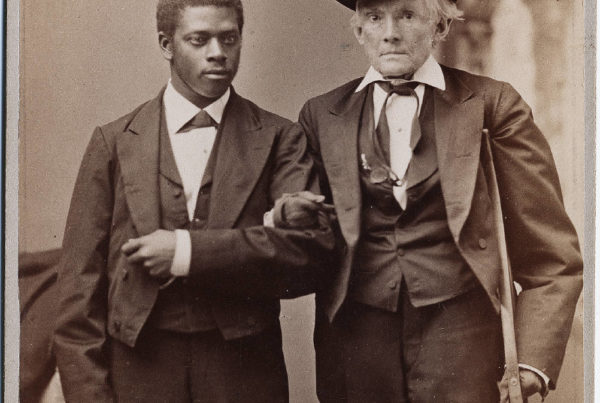I want to look at Southerners going back to Europe long after the roots were planted, especially in the period before the second War of Independence began in 1861. The reason for looking at this is what it tells us about Southerners. One of the things it tells us is that we Southerners were a people. Our relationship to Europe had not much in common with that of those other people, the troublesome ones building their City upon a Hill up in Massachusetts. More than one Southerner encountering Yankees in Europe first began to realize that we were not the same people.
By the 1830s if not before Americans had perceived the eminence of the German universities and begun to frequent them. When Johnston Pettigrew arrived from Charleston to enter the University of Berlin in 1850, there were about 20 Americans there pursuing advanced studies of one sort or another. With only a few exceptions they were from Massachusetts and South Carolina, and in the unfamiliar environment it was obvious that there were two different national characters present under one citizenship. Their goals, motives, and habits, and especially their personal virtues were distinct. Pettigrew wrote that the Yankees were studious and stingy, the Southerners generous and sociable. He added that the Yankees made themselves disagreeable by constant boasting about the superiority of the United States, except for the South, of course, which they relentlessly slandered to any foreigner who would listen.
Of course, some contact had always been maintained with Europe. During the colonial period, Robert Beverley and William Byrd II, who I mentioned earlier, had been to England, Byrd twice. A number of the Revolutionary leaders of South Carolina had been educated at the Inns of Court in London and a few had been to English and Scottish universities. Commercial ties with France and Holland never entirely disappeared. Jefferson was an exemplary Southerner abroad. He spent a long period in France and toured much of the continent. He brought back books, technology, and a sample of every plant he encountered of potential use to agriculture at home.
You literary types may remember that in the early 1800s, Edgar Allan Poe was sent to school for a time in England. But I will concentrate on the period from the late 1840s up to the war.
By 1850, regularly scheduled steam packets could make the trip from New York to Liverpool in under two weeks, a vast improvement over earlier times. This was partly due to steam power and partly due to a Southerner, Matthew Fontaine Maury, whose studies of ocean currents had literally revolutionized the world’s navigation. Maury was a scientist of international reputation when he resigned from the U.S. Navy in 1861 to join the Confederacy.
The two weeks meant that any reasonably affluent American could visit Europe and take the whole family. Even that an American could live in Europe but still come home for a visit every couple of years. It also meant improved communications. News was fresh compared to earlier times and the European journals and quarterlies were readily available. Southerners with intellectual interests had a good idea of what was going on in the world, not only current events but currents of thought as they developed. They drew different conclusions about these than Yankees did. It is a fact that there were more college educated white men and women in the South than in the North in 1860. I suspect there was also a larger number of European travelers because Southerners put more emphasis on cultivation and less on sheer money-making than did Yankees—as everyone understood at the time. The idea that antebellum Southerners were backward and uncultured is another lie.
We can look at the differing lessons Yankees and Southerners learned in Europe by a glance at two Massachusetts intellectuals who studied at German universities. When Ralph Waldo Emerson came back, he announced that the sacraments were a relic of barbarism and resigned from the ministry. Then he began to declaim a Yankeeized Hegelian doctrine in which the American (by which he meant the Bostonian) was a New Man, unknown to the world before, destined to lead a march toward the perfection of humanity which the dialectical process had revealed as inevitable. The march, of course, required the continual eliminating of impurities from society—impurity being anything in the way of rule by Massachusetts saints. The South was the biggest and most glaring of the impurities that had to be purged from history. Emerson is still widely regarded as THE American philosopher and his version of the meaning of America is still very much alive and causing infinite mischief today.
George Bancroft worked on a somewhat lower level. His German education, facile pen, and public relations savvy gave him a claim to be THE American historian. What he had learned abroad is that the free and self-governing institutions of Americans were simply the inevitable flowering of seed that had been planted by noble German tribesmen in the forests of Northern Europe centuries before. American folklore has it that the North was led by visions of liberty in its campaign against Southern evil. What was actually happening was that New Englanders were claiming their right as the purest Anglo-Saxon to lord it over mongrel Southerners. To the dominant elements of the North in The War Freeing the blacks was not a crusade for equality. It was simply the first step in getting rid of them.
Contrast James Warley Miles of Charleston who endured much of the same European education and was widely read in German philosophy. He was an Episcopal priest and longtime librarian of the College of Charleston whose theological writings were known beyond the United States. He had lived not only in Europe but in the Near and Mideast and was said to have mastered forty languages. The German philosophers never convinced him that history was the story of the inevitable progress of the master race to perfection or that Christianity was a relic to be discarded.
There were many reasons for antebellum Southerners to visit the Old World: pleasure and edification and adventure and business; study, particularly true for those seeking to advance beyond what America could offer in the crafts of painting and sculpture and certain scientific disciplines. Southerners invariably came home with all the rare books and paintings they were able to acquire.
Some Americans went abroad officially. Washington Irving of New York, who was more a Southerner than a Yankee, turned his years as Minister to Spain into literary gold. John C. Calhoun’s daughter and son-in-law spent several years in Belgium where the son-in-law was U.S. Charge d’Affaires. They wrote informative and astute letters home that are still interesting. My favourite Southern traveler is Lucy Pickens. She was Lucy Holcombe from Texas, who had married Francis Pickens of South Carolina. In the period just before he came home to become the secession governor of South Carolina, Pickens was U.S. Minister to Russia, where the Czar developed a tremendous (but unrequited) crush on Lucy. She was widely regarded as the most beautiful woman in America, and I believe is still the only woman ever portrayed on American currency. You may have seen the Confederate bills with her picture. She was not only beautiful, she was highly intelligent and wrote books.
There were common reactions among the Southerners. One was disillusionment with England. The England of country gentry out of which the South had been planted had ceased to figure. England was now the land of bankers, factories, stock speculators, taxes, glaring class barriers, and vast expanses of urban poverty reeking with human degradation. Southerners were perfectly well aware that their slaves lived lives immeasurably more comfortable than the poor of London—or for that matter, of New York. Only Southerners who had not seen the new Albion had hopelessly romantic notions that old England would come to the aid of the South in the war.
Almost all Southerners were confirmed in their faith as republicans, with the small “r” by first hand acquaintance with Europe. Europe seemed to be always in a desperate struggle between mob law and martial law, between autocracy and revolution. The happy medium of a free but law-abiding republic seemed forever unacheivable. This was basically the same reaction that Jefferson had had to the French Revolution and that Calhoun and other Southerners had to the Revolutions of 1848. They wished that Europe might find a way to stable freedom, but doubted that either the autocrats or the revolutionaries were likely to bring that about.
Johnston Pettigrew arriving in Berlin noted that the train was met by armed soldiers, that passport was demanded at every juncture, things unthinkable in America. He wrote later about his response when asked if there were beggars in America.
I replied no; . . . that every honest, industrious man could at least gain a livelihood, and though there were many disagreeable things at home, this alone would compensate for them all if one were reduced to a comparison with EUROPE. . . . a LONG TRAIN OF FREIGHT CARS WAS DRAWN UP AT THE STATION, TO AVOID THE TROUBLE OF GOING AROUND WHICH, I WAS ABOUT TO PASS BETWEEN, BUT WAS STOPPED BY THE GUard. This caused me to mention for their doubting admiration another precious privilege of the freeman in America, equally incomprehensible, viz: that of getting yourself killed, whenever you feel in the humour, without the hindrance of officious philanthropists in police uniform.
At the sight of some German princelings he wrote:
My democratic, republican blood boiled over AT THE BARE SIGHT. Figure to yourself a man of rather larger body than ordinary, a countenance not intelligent to say the least, forehead retreating, a military coat, with tremnendous epaulettes, his breast covered with ribbands and stars, which he does not deserve….So many lounging, idle, ugly, worthless people I had never seen before . . . . The more I see of such creatures, the more awfully republican I become.
Pettigrew’s affinities and dislikes, as I tried to tell in my book, help us to understand what a Southerner was. He decided early on that the British and Germans were no better than Yankees—materialistic, grasping, boastful, without honour or grace. He fell in love with the Italians and Spanish who he found to be like the South—full of charming women and brave men. Like Dixie they had so far resisted the spiritual devastation of the modern age.
In proportion as we approached Italy, my feeling of satisfaction arose, I felt as I used to do on leaving the Yankee land on the way South. At almost every railway station, one could perceive an increase in the beauty oif the women, in the socialability of the men, and in the smiling genial aspect of the country.
This Southerner liked Spain ever better. This at a time when the North and Britain were full of assumptions about Anglo-Saxon superiority.
He loved Italy so much that he made a second trip in 1859 when he heard that war had broken out. It was one of a series of wars by which the kingdom of Sardinia, usually with French assistance was gradually freeing the northern provinces of Italy from rulke by Germans. Pettigrew arrived too late after a decisive victory at Soilferino had resulted in freeing Lombardy from Austrian rule. Many many years later I was able to visit the same battlefield at Solferino that Pettigrew saw. The topography and the course of the battle was very similar to Gettysburg where a charge broke the center of the enemy line. Pettigrew took part in a similar action on the 3rd day at Gettysburg, except it did not suceed.







